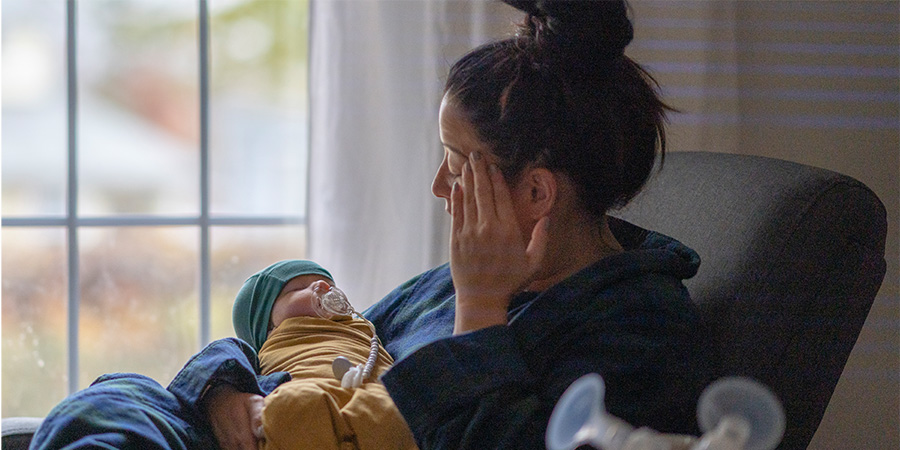Recognizing postpartum depression (it doesn’t only affect new moms!)
January 3, 2024
Welcoming a new baby into your family is an exciting time full of change and new routines. But for many new parents, postpartum depression is a complication they weren’t prepared to experience.
An estimated seven out of 10 new moms in the U.S. suffer from some sort of depression after having a baby, ranging from a milder form of depression known as the “baby blues” to postpartum psychosis.
“The baby blues usually occur pretty quickly after birth,” says Deborah Johnston, a clinical social worker at GBMC HealthCare. “It’s usually characterized by intense mood swings and feelings of overwhelm or anxiousness, but it tends to go away a couple of weeks after the baby is born. Postpartum depression can happen up to a year after giving birth and presents differently for everyone.”
After childbirth, a mother can experience varied emotions ranging from joy and pleasure to sadness and bouts of crying. These feelings of sadness and tearfulness are called "baby blues," and they tend to decrease over the first two weeks after delivery. Baby blues are extremely common and estimated to occur in more than half of women within the first few weeks after delivery.
Postpartum depression tends to last longer and severely affects women's ability to return to normal function. Occurring in approximately 6 to 20% of women, PPD affects the mother as well as her relationship with the infant.
And it isn’t limited just to the person who gave birth. Adoptive mothers, women who have miscarried, and even men are at risk, according to Johnston.
“We estimate about one in 10 new dads experience postpartum depression,” she says. “They’re expected to go back to work right away, to be the doers and the fixers and the support person for the mom, but not as many people are asking him how he’s doing.”
Pregnancy raises estrogen and progesterone levels in women, but once the baby is born those hormones quickly fall to pre-pregnancy levels. These hormonal changes, coupled with lack of sleep and increased amounts of stress and anxiousness over a new baby, are all possible causes of postpartum depression.
“Having a history of depression or anxiety will put you at higher risk, but the baseline for every person is different,” Johnston explains. “There’s a spectrum of symptoms and severity when it comes to postpartum depression, which makes it very beneficial to catch it early.”
It's difficult to pinpoint who will be affected by postpartum depression, Johnston says, but the staff at GBMC makes it a priority to evaluate the mental health of both parents after the birth.
“They’re asked 10 questions to rate how they’re doing on a scale. Then they’re given a score between zero and 30. If they score a 10 or above, a social worker will meet with them to give them resources, find out more about their history, and most importantly, give them permission to take care of themselves.”
Having a hard time coping with the change a new baby can bring, trouble sleeping, and withdrawing from family and friends are all signs someone might be suffering from depression, but it can be hard to recognize it in yourself at first.
“Partners are often the first to notice that something is off,” Johnston says. She encourages everyone to not hesitate in asking for help. “Talk to your doctor and share your concerns with family and significant people in your life. Don’t be afraid to ask for and receive help during this time.”
Much like the oxygen mask safety recommendations on an airplane, Johnston says, it is imperative new parents protect their mental health first before worrying about everyone else.
“Self care is your oxygen during this time,” she emphasizes. “Give yourself permission to recover, limit visitors, and set boundaries. Ask for help and say thank you when it’s offered.”
Her biggest piece of advice to new parents? Get sleep whenever you can.
“Lack of sleep takes away all your defenses!” Johnston says. “Taking a nap is taking care of the baby, just get some sleep!”
Johnston says Postpartum Support International is a fantastic resource for finding support groups (both in person and via Zoom) and talking with experts.




